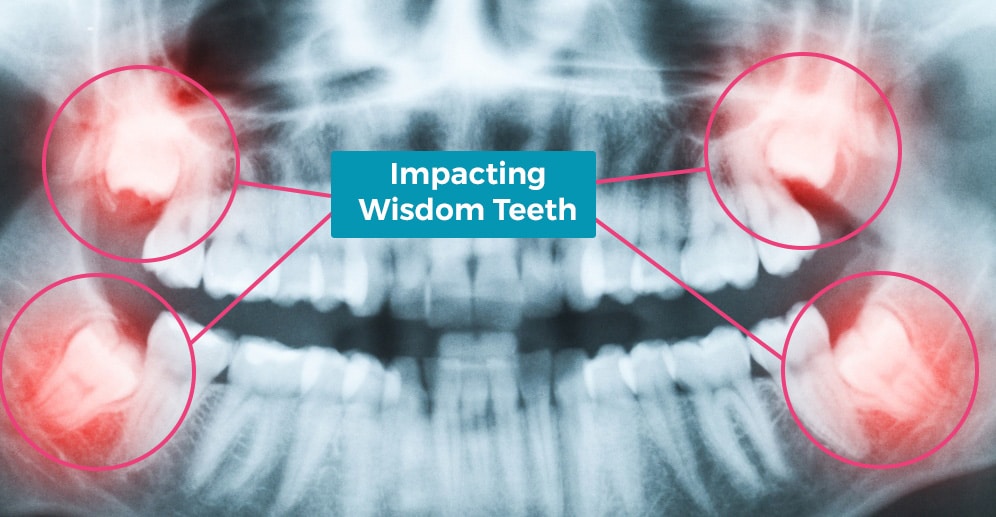Wisdom Teeth Removal
If you suffer from jaw pain, recurring sore throats, bouts of bad breath?
In most cases, there will not be enough space for wisdom teeth to erupt. It can cause several issues. Partially erupted wisdom teeth are very difficult to clean and brush. When food and bacteria build up between the wisdom teeth and adjacent molars, this eventually leads to tooth decay and gum infection.
The upper Wisdom Teeth have a tendency to lean sideways and grate against the cheek. These wisdom teeth usually cause ulceration and a lot of pain.
Reasons your wisdom teeth may need to be removed
- Decay
- Infection
- Crowding
- Cysts

Wisdom Teeth Symptoms
If you suspect your pain to be associated with your wisdom tooth, make an appointment with us right away.
Ignoring the symptoms of wisdom teeth could cause additional problems down the track, like a more complicated surgery (with higher costs) or the formation of cysts which could lead to tumours and plenty of painful sessions at the dentist.
Signs of Wisdom Teeth Pain:
- Tenderness and jaw pain
- Redness
- Swelling of the gums around the tooth
- Bad breath
- Bad taste in mouth when eating foods
- Look for cysts, which are pockets of liquid, around the tooth
Gentle Procedures for Wisdom Teeth removal
Extracting teeth is viewed as a last resort in modern dentistry and usually only occurs as a result of chronic disease or trauma. One clear exception to this is the removal of our wisdom teeth, known dentally as our third molars, and we are experts in wisdom teeth in Perth.
Biologically, these teeth were designed as replacements for our back teeth as they became worn based on the coarse, abrasive diet of the “cave man”. Today, they form an unnecessary and often problematic part of our dentition.
Wisdom teeth usually don’t “erupt” through the gums until we’re teenagers or in our twenties. They are usually the last teeth to come into our mouth. The majority of us have four wisdom teeth. Quite often, there is little space at the rear of the jaw for wisdom teeth to come easily through the gums. If the jaw does not have enough room for the wisdom tooth to come through, the tooth will become wedged or impacted.
Some impacted wisdom teeth remain buried and cause no trouble. However, other impacted wisdom teeth may cause severe problems.

Removal of a wisdom tooth is a common procedure and troublesome wisdom teeth should be removed as soon as possible before the problems get worse.
An impacted wisdom tooth will start to push through the gum and an infection can start around the top of the tooth. Infection and inflammation can cause pain, swelling and jaw stiffness. Swallowing may be painful and the infection can cause bad breath.
If a wisdom tooth is not removed, a cyst can form around the tooth and may displace the tooth. This can destroy bone and damage other teeth and the gums. An impacted wisdom tooth may keep pushing the molar next to it. This can cause an erosion cavity where the wisdom tooth hits the other molar. This often leads to serious damage to both teeth. The molars may become infected or abscessed. Removal of both molars is often needed.
An upper wisdom tooth may push sideways out of the gum. It may cause an ulcer where it rubs against the inside of the cheek. Food can also become trapped between the wisdom tooth and the molar next to it. This can cause cavities in both teeth.
It’s always a good idea to ask about the state of play of your wisdom teeth during your check-up.
If a tooth needs to be removed, we can offer you happy gas and sedation, which help to reduce pain and any anxiety during wisdom teeth removal.
The content on the LifeCare Dental website is provided for education and information purposes only. Information about therapy, service, product or treatment does not imply endorsement and is not intended to replace advice received from your dentist, doctor or other registered health professionals. LifeCare Dental makes no claim as to the accuracy or authenticity of this content.
Additionally, LifeCare Dental does not accept liability to any person for the information or advice provided on this website or incorporated into it by reference. Content has been prepared for Western Australian residents and wider Australian audiences, and was accurate at the time of publication. Readers should note that, over time, currency and completeness of the information may change. All users are urged to always seek advice from a registered health care professional for diagnosis and answers to their medical questions.

